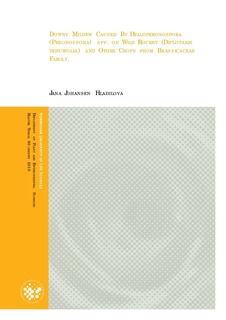| dc.description.abstract | Abstract
Downy mildew is caused by plant parasitic Oomycetes from the genus Hyaloperonospora and the genus Peronospora. Downy mildew is a common disease of brassicas and closely related cruciferous crops. This thesis surveys downy mildew caused by Hyaloperonospora (Peronospora) spp. with focus on the rocket salad species.
The susceptibility experiment was carried out to research the host specificity of plant parasitic Oomycetes Hyaloperonospora (Peronospora) spp. on rocket salad (wild rocket, Diplotaxis tenuifolia and cultivated rocket salad, Eruca sativa) and other chosen crops from the Brassicaceae family (broccoli, cauliflower, swede, oil seeds rape) at the seedlings stage. Seedlings were inoculated with different isolates (frozen plant material from 2008, diseased brassicas and closely related cruciferous crops from the fields in Norway and diseased cruciferous weeds grown close to the fields with the Brassicaceae family crops). The experiment has shown that the pathogen from a certain host plant species was more aggressive on plants of the same species. The pathogen from the host plant D. tenuifolia was significantly more aggressive on seedlings of D. tenuifolia. The pathogen from the host plant broccoli was more aggressive on broccoli seedlings, but was also capable to infect cauliflower, swede and oilseed rape. The pathogen from host plant swede was more aggressive on seedlings of swede, but disease was observed also on cauliflower and broccoli.
The thesis also covers a survey of the survival of conidia in the air. The spores of Hyaloperonospora (Peronospora) spp. were exposed to solar radiation for different time intervals. Afterwards, the viability of these spores was evaluated. Results from the experiment indicate a certain decreasing trend in the viability of spores over the time of their exposure.
The third experimental part surveys whether the overwintering structures of Hyaloperonospora (Peronospora) spp. in the soil can cause an infection on the seedlings of D. tenuifolia. The soil from the fields, where rocket salad was grown previous years, was sampled. An occurrence of the disease on the seedlings of D. tenuifolia was observed. The disease was not observed on the experimental seedlings. | en_US |
